Skills Development at Sainsbury: Coaching, Mentoring, and Work Culture
VerifiedAdded on 2020/01/07
|12
|3873
|168
Report
AI Summary
This report provides a comprehensive analysis of skills development within Sainsbury's, emphasizing the importance of coaching and mentoring programs. The report explores the roles of coaching and mentoring, highlighting their benefits in enhancing employee performance, fostering open learning, and improving problem-solving abilities. It differentiates between coaching and mentoring, comparing their impacts on skills advancement and team effectiveness. The report further discusses the crucial role of line managers in designing and implementing these programs, emphasizing their involvement in induction activities, work allocation, and multi-skill development. The report underscores the significance of aligning coaching and mentoring with organizational needs and employee expectations to promote lifelong learning and sustainable development. The report also explores the disadvantages of coaching and mentoring, such as the impact of a high number of learners in coaching programs and the potential for differences in perception between employees and coaches.

Developing Skills
1
1
Paraphrase This Document
Need a fresh take? Get an instant paraphrase of this document with our AI Paraphraser
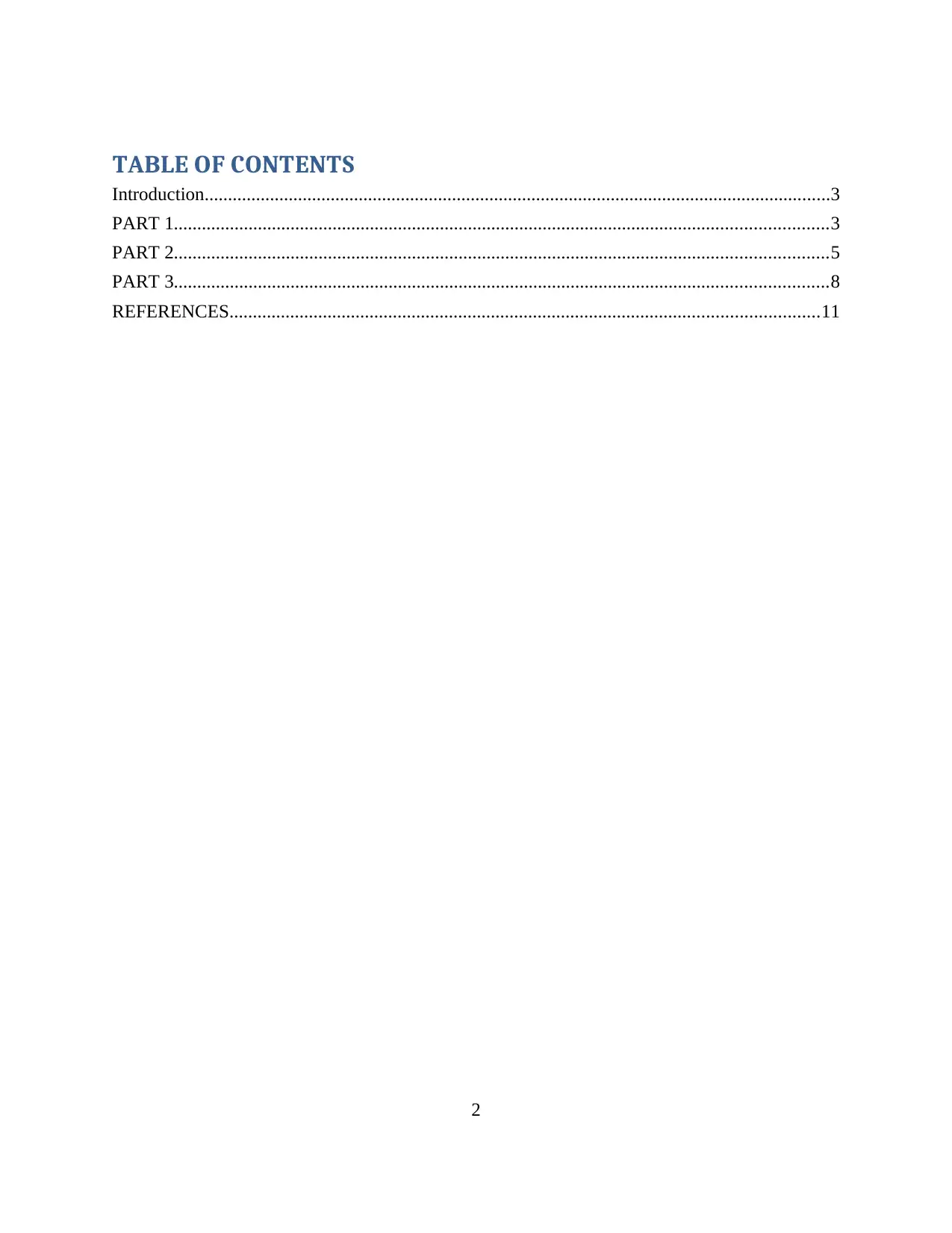
TABLE OF CONTENTS
Introduction......................................................................................................................................3
PART 1............................................................................................................................................3
PART 2............................................................................................................................................5
PART 3............................................................................................................................................8
REFERENCES..............................................................................................................................11
2
Introduction......................................................................................................................................3
PART 1............................................................................................................................................3
PART 2............................................................................................................................................5
PART 3............................................................................................................................................8
REFERENCES..............................................................................................................................11
2
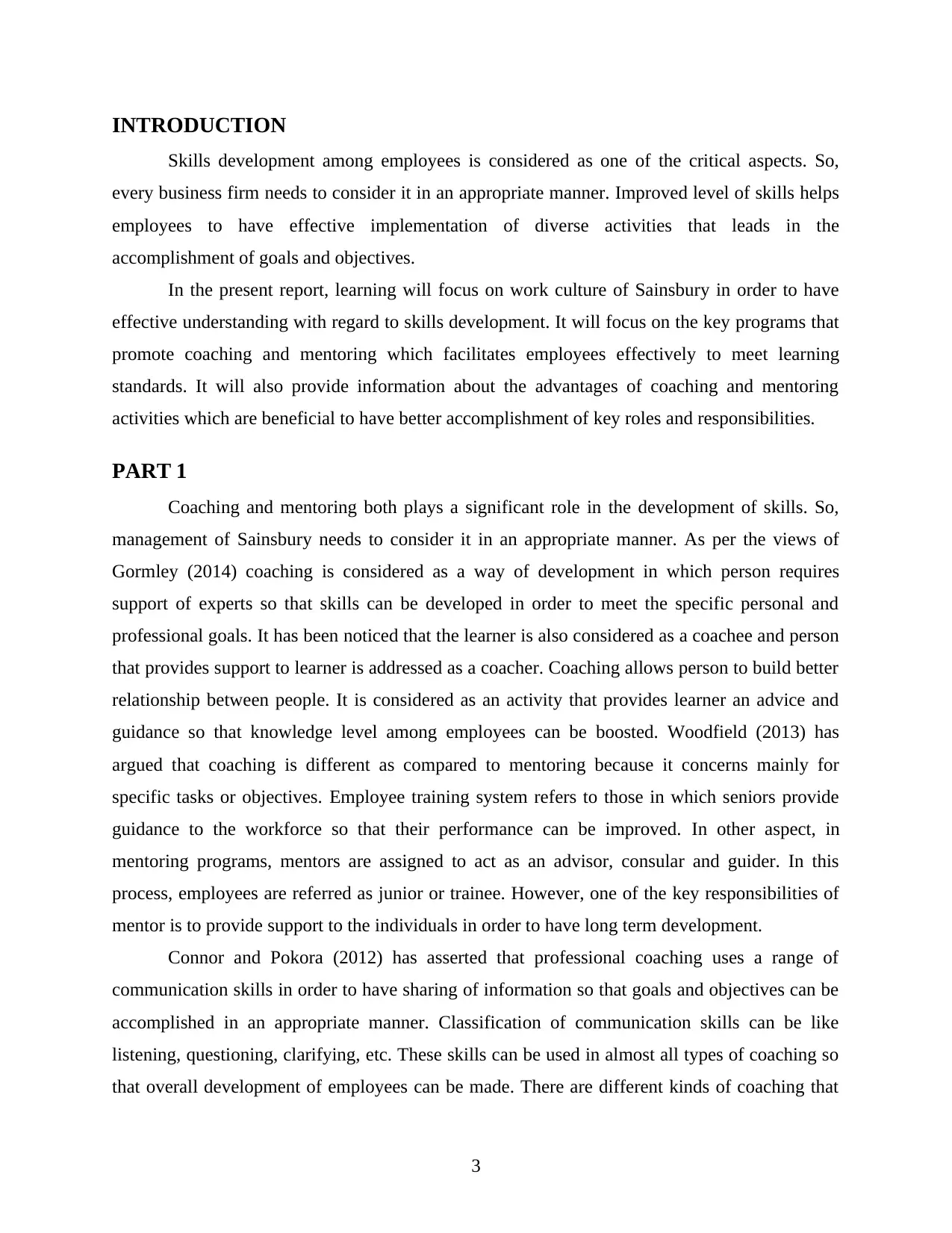
INTRODUCTION
Skills development among employees is considered as one of the critical aspects. So,
every business firm needs to consider it in an appropriate manner. Improved level of skills helps
employees to have effective implementation of diverse activities that leads in the
accomplishment of goals and objectives.
In the present report, learning will focus on work culture of Sainsbury in order to have
effective understanding with regard to skills development. It will focus on the key programs that
promote coaching and mentoring which facilitates employees effectively to meet learning
standards. It will also provide information about the advantages of coaching and mentoring
activities which are beneficial to have better accomplishment of key roles and responsibilities.
PART 1
Coaching and mentoring both plays a significant role in the development of skills. So,
management of Sainsbury needs to consider it in an appropriate manner. As per the views of
Gormley (2014) coaching is considered as a way of development in which person requires
support of experts so that skills can be developed in order to meet the specific personal and
professional goals. It has been noticed that the learner is also considered as a coachee and person
that provides support to learner is addressed as a coacher. Coaching allows person to build better
relationship between people. It is considered as an activity that provides learner an advice and
guidance so that knowledge level among employees can be boosted. Woodfield (2013) has
argued that coaching is different as compared to mentoring because it concerns mainly for
specific tasks or objectives. Employee training system refers to those in which seniors provide
guidance to the workforce so that their performance can be improved. In other aspect, in
mentoring programs, mentors are assigned to act as an advisor, consular and guider. In this
process, employees are referred as junior or trainee. However, one of the key responsibilities of
mentor is to provide support to the individuals in order to have long term development.
Connor and Pokora (2012) has asserted that professional coaching uses a range of
communication skills in order to have sharing of information so that goals and objectives can be
accomplished in an appropriate manner. Classification of communication skills can be like
listening, questioning, clarifying, etc. These skills can be used in almost all types of coaching so
that overall development of employees can be made. There are different kinds of coaching that
3
Skills development among employees is considered as one of the critical aspects. So,
every business firm needs to consider it in an appropriate manner. Improved level of skills helps
employees to have effective implementation of diverse activities that leads in the
accomplishment of goals and objectives.
In the present report, learning will focus on work culture of Sainsbury in order to have
effective understanding with regard to skills development. It will focus on the key programs that
promote coaching and mentoring which facilitates employees effectively to meet learning
standards. It will also provide information about the advantages of coaching and mentoring
activities which are beneficial to have better accomplishment of key roles and responsibilities.
PART 1
Coaching and mentoring both plays a significant role in the development of skills. So,
management of Sainsbury needs to consider it in an appropriate manner. As per the views of
Gormley (2014) coaching is considered as a way of development in which person requires
support of experts so that skills can be developed in order to meet the specific personal and
professional goals. It has been noticed that the learner is also considered as a coachee and person
that provides support to learner is addressed as a coacher. Coaching allows person to build better
relationship between people. It is considered as an activity that provides learner an advice and
guidance so that knowledge level among employees can be boosted. Woodfield (2013) has
argued that coaching is different as compared to mentoring because it concerns mainly for
specific tasks or objectives. Employee training system refers to those in which seniors provide
guidance to the workforce so that their performance can be improved. In other aspect, in
mentoring programs, mentors are assigned to act as an advisor, consular and guider. In this
process, employees are referred as junior or trainee. However, one of the key responsibilities of
mentor is to provide support to the individuals in order to have long term development.
Connor and Pokora (2012) has asserted that professional coaching uses a range of
communication skills in order to have sharing of information so that goals and objectives can be
accomplished in an appropriate manner. Classification of communication skills can be like
listening, questioning, clarifying, etc. These skills can be used in almost all types of coaching so
that overall development of employees can be made. There are different kinds of coaching that
3
⊘ This is a preview!⊘
Do you want full access?
Subscribe today to unlock all pages.

Trusted by 1+ million students worldwide
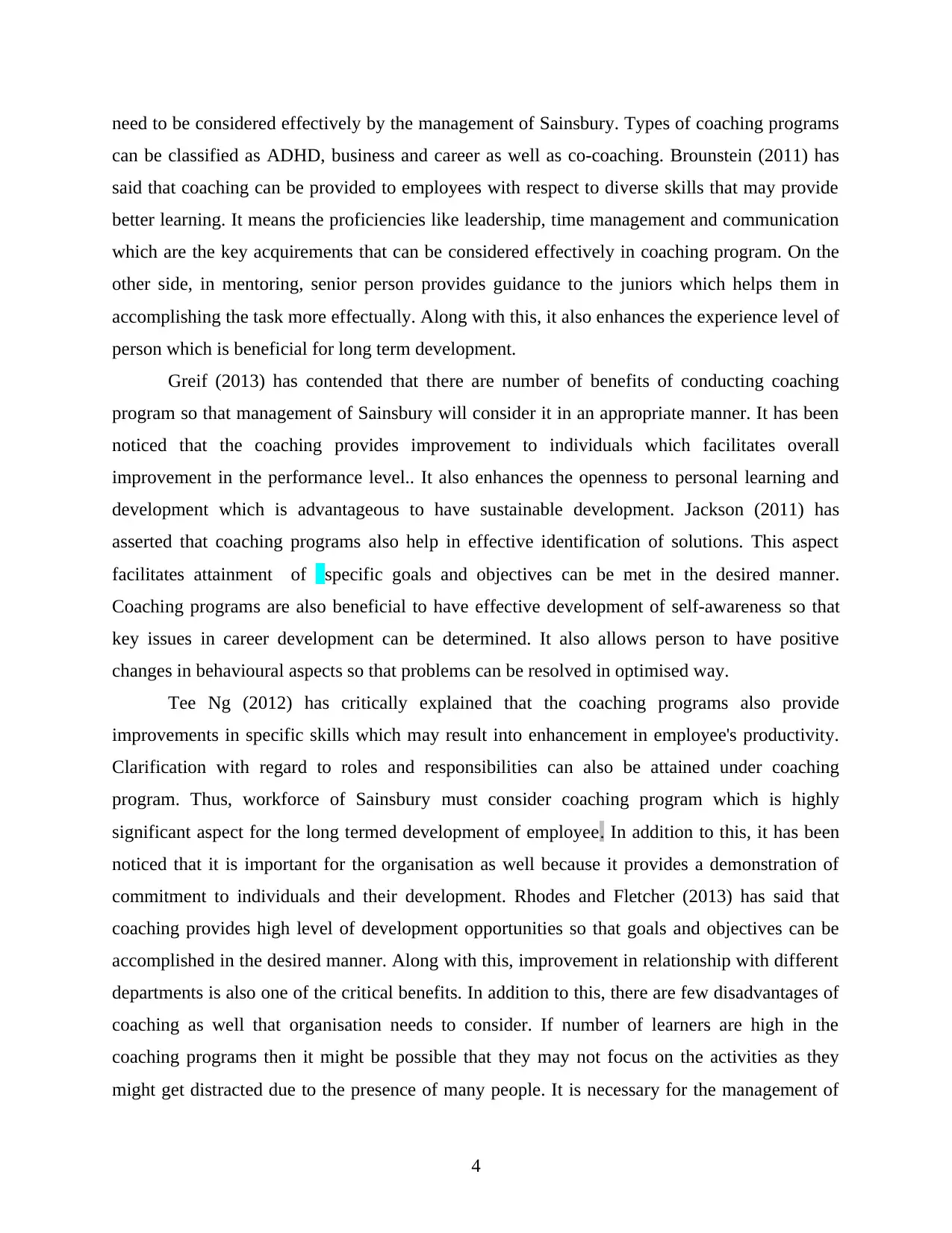
need to be considered effectively by the management of Sainsbury. Types of coaching programs
can be classified as ADHD, business and career as well as co-coaching. Brounstein (2011) has
said that coaching can be provided to employees with respect to diverse skills that may provide
better learning. It means the proficiencies like leadership, time management and communication
which are the key acquirements that can be considered effectively in coaching program. On the
other side, in mentoring, senior person provides guidance to the juniors which helps them in
accomplishing the task more effectually. Along with this, it also enhances the experience level of
person which is beneficial for long term development.
Greif (2013) has contended that there are number of benefits of conducting coaching
program so that management of Sainsbury will consider it in an appropriate manner. It has been
noticed that the coaching provides improvement to individuals which facilitates overall
improvement in the performance level.. It also enhances the openness to personal learning and
development which is advantageous to have sustainable development. Jackson (2011) has
asserted that coaching programs also help in effective identification of solutions. This aspect
facilitates attainment of specific goals and objectives can be met in the desired manner.
Coaching programs are also beneficial to have effective development of self-awareness so that
key issues in career development can be determined. It also allows person to have positive
changes in behavioural aspects so that problems can be resolved in optimised way.
Tee Ng (2012) has critically explained that the coaching programs also provide
improvements in specific skills which may result into enhancement in employee's productivity.
Clarification with regard to roles and responsibilities can also be attained under coaching
program. Thus, workforce of Sainsbury must consider coaching program which is highly
significant aspect for the long termed development of employee. In addition to this, it has been
noticed that it is important for the organisation as well because it provides a demonstration of
commitment to individuals and their development. Rhodes and Fletcher (2013) has said that
coaching provides high level of development opportunities so that goals and objectives can be
accomplished in the desired manner. Along with this, improvement in relationship with different
departments is also one of the critical benefits. In addition to this, there are few disadvantages of
coaching as well that organisation needs to consider. If number of learners are high in the
coaching programs then it might be possible that they may not focus on the activities as they
might get distracted due to the presence of many people. It is necessary for the management of
4
can be classified as ADHD, business and career as well as co-coaching. Brounstein (2011) has
said that coaching can be provided to employees with respect to diverse skills that may provide
better learning. It means the proficiencies like leadership, time management and communication
which are the key acquirements that can be considered effectively in coaching program. On the
other side, in mentoring, senior person provides guidance to the juniors which helps them in
accomplishing the task more effectually. Along with this, it also enhances the experience level of
person which is beneficial for long term development.
Greif (2013) has contended that there are number of benefits of conducting coaching
program so that management of Sainsbury will consider it in an appropriate manner. It has been
noticed that the coaching provides improvement to individuals which facilitates overall
improvement in the performance level.. It also enhances the openness to personal learning and
development which is advantageous to have sustainable development. Jackson (2011) has
asserted that coaching programs also help in effective identification of solutions. This aspect
facilitates attainment of specific goals and objectives can be met in the desired manner.
Coaching programs are also beneficial to have effective development of self-awareness so that
key issues in career development can be determined. It also allows person to have positive
changes in behavioural aspects so that problems can be resolved in optimised way.
Tee Ng (2012) has critically explained that the coaching programs also provide
improvements in specific skills which may result into enhancement in employee's productivity.
Clarification with regard to roles and responsibilities can also be attained under coaching
program. Thus, workforce of Sainsbury must consider coaching program which is highly
significant aspect for the long termed development of employee. In addition to this, it has been
noticed that it is important for the organisation as well because it provides a demonstration of
commitment to individuals and their development. Rhodes and Fletcher (2013) has said that
coaching provides high level of development opportunities so that goals and objectives can be
accomplished in the desired manner. Along with this, improvement in relationship with different
departments is also one of the critical benefits. In addition to this, there are few disadvantages of
coaching as well that organisation needs to consider. If number of learners are high in the
coaching programs then it might be possible that they may not focus on the activities as they
might get distracted due to the presence of many people. It is necessary for the management of
4
Paraphrase This Document
Need a fresh take? Get an instant paraphrase of this document with our AI Paraphraser
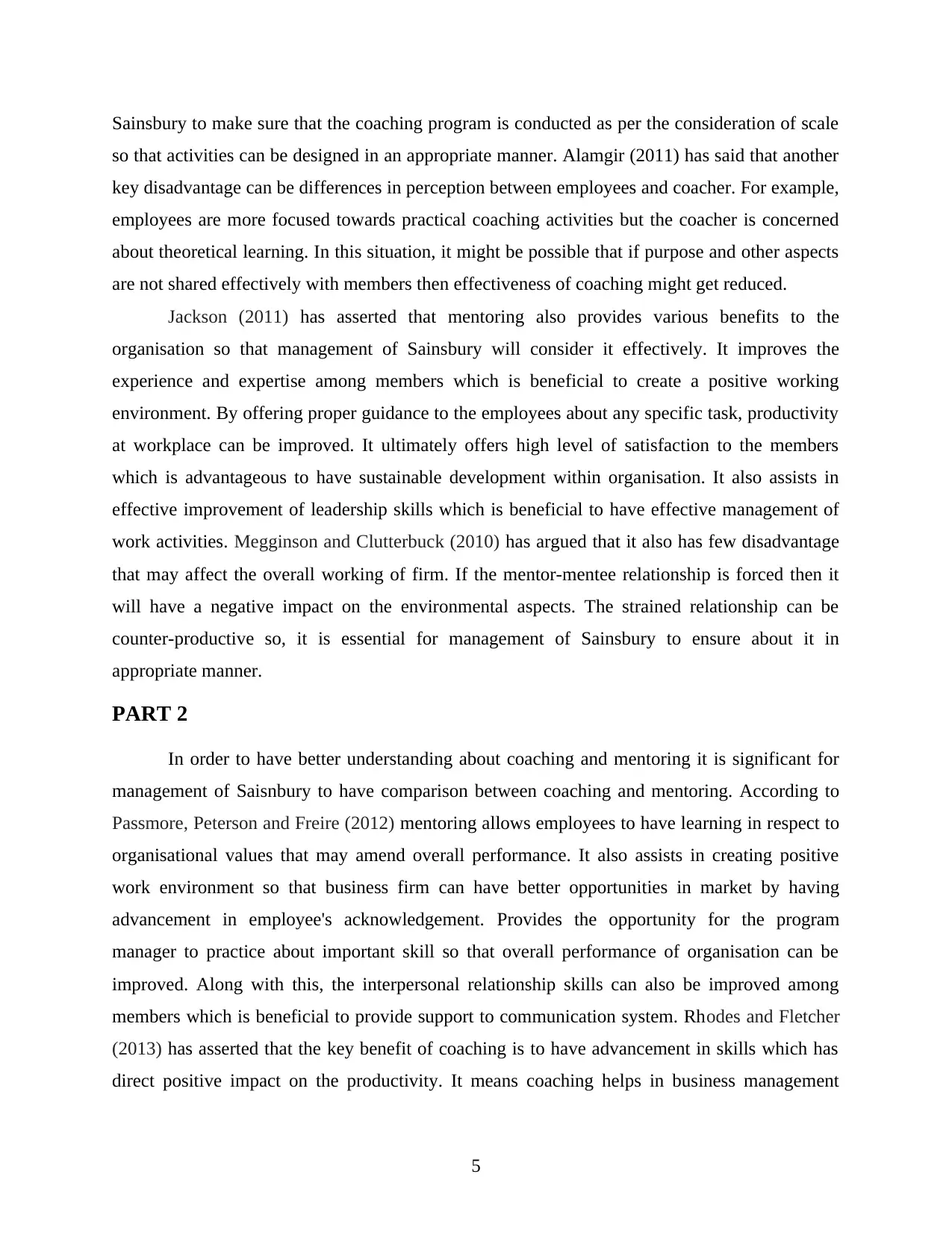
Sainsbury to make sure that the coaching program is conducted as per the consideration of scale
so that activities can be designed in an appropriate manner. Alamgir (2011) has said that another
key disadvantage can be differences in perception between employees and coacher. For example,
employees are more focused towards practical coaching activities but the coacher is concerned
about theoretical learning. In this situation, it might be possible that if purpose and other aspects
are not shared effectively with members then effectiveness of coaching might get reduced.
Jackson (2011) has asserted that mentoring also provides various benefits to the
organisation so that management of Sainsbury will consider it effectively. It improves the
experience and expertise among members which is beneficial to create a positive working
environment. By offering proper guidance to the employees about any specific task, productivity
at workplace can be improved. It ultimately offers high level of satisfaction to the members
which is advantageous to have sustainable development within organisation. It also assists in
effective improvement of leadership skills which is beneficial to have effective management of
work activities. Megginson and Clutterbuck (2010) has argued that it also has few disadvantage
that may affect the overall working of firm. If the mentor-mentee relationship is forced then it
will have a negative impact on the environmental aspects. The strained relationship can be
counter-productive so, it is essential for management of Sainsbury to ensure about it in
appropriate manner.
PART 2
In order to have better understanding about coaching and mentoring it is significant for
management of Saisnbury to have comparison between coaching and mentoring. According to
Passmore, Peterson and Freire (2012) mentoring allows employees to have learning in respect to
organisational values that may amend overall performance. It also assists in creating positive
work environment so that business firm can have better opportunities in market by having
advancement in employee's acknowledgement. Provides the opportunity for the program
manager to practice about important skill so that overall performance of organisation can be
improved. Along with this, the interpersonal relationship skills can also be improved among
members which is beneficial to provide support to communication system. Rhodes and Fletcher
(2013) has asserted that the key benefit of coaching is to have advancement in skills which has
direct positive impact on the productivity. It means coaching helps in business management
5
so that activities can be designed in an appropriate manner. Alamgir (2011) has said that another
key disadvantage can be differences in perception between employees and coacher. For example,
employees are more focused towards practical coaching activities but the coacher is concerned
about theoretical learning. In this situation, it might be possible that if purpose and other aspects
are not shared effectively with members then effectiveness of coaching might get reduced.
Jackson (2011) has asserted that mentoring also provides various benefits to the
organisation so that management of Sainsbury will consider it effectively. It improves the
experience and expertise among members which is beneficial to create a positive working
environment. By offering proper guidance to the employees about any specific task, productivity
at workplace can be improved. It ultimately offers high level of satisfaction to the members
which is advantageous to have sustainable development within organisation. It also assists in
effective improvement of leadership skills which is beneficial to have effective management of
work activities. Megginson and Clutterbuck (2010) has argued that it also has few disadvantage
that may affect the overall working of firm. If the mentor-mentee relationship is forced then it
will have a negative impact on the environmental aspects. The strained relationship can be
counter-productive so, it is essential for management of Sainsbury to ensure about it in
appropriate manner.
PART 2
In order to have better understanding about coaching and mentoring it is significant for
management of Saisnbury to have comparison between coaching and mentoring. According to
Passmore, Peterson and Freire (2012) mentoring allows employees to have learning in respect to
organisational values that may amend overall performance. It also assists in creating positive
work environment so that business firm can have better opportunities in market by having
advancement in employee's acknowledgement. Provides the opportunity for the program
manager to practice about important skill so that overall performance of organisation can be
improved. Along with this, the interpersonal relationship skills can also be improved among
members which is beneficial to provide support to communication system. Rhodes and Fletcher
(2013) has asserted that the key benefit of coaching is to have advancement in skills which has
direct positive impact on the productivity. It means coaching helps in business management
5
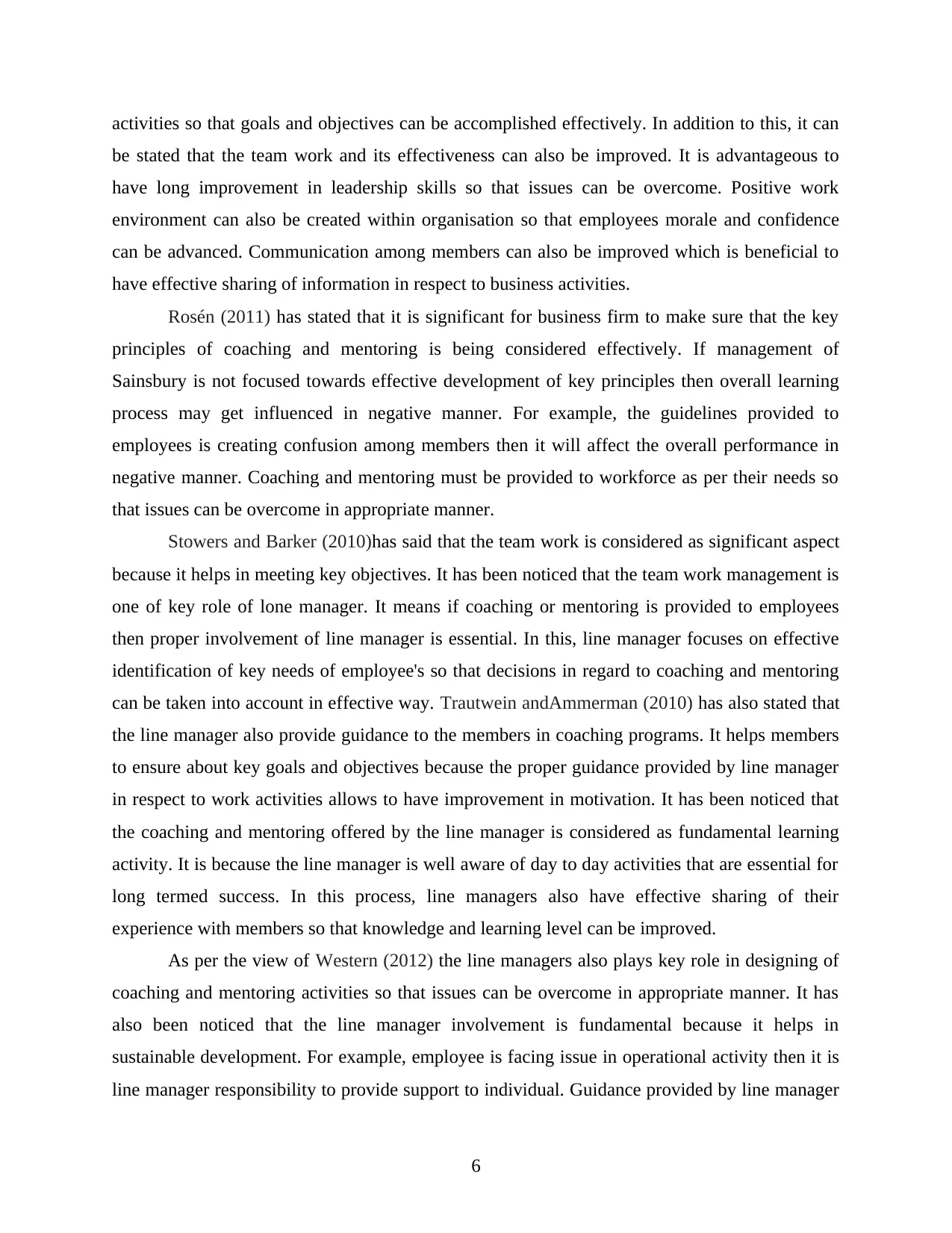
activities so that goals and objectives can be accomplished effectively. In addition to this, it can
be stated that the team work and its effectiveness can also be improved. It is advantageous to
have long improvement in leadership skills so that issues can be overcome. Positive work
environment can also be created within organisation so that employees morale and confidence
can be advanced. Communication among members can also be improved which is beneficial to
have effective sharing of information in respect to business activities.
Rosén (2011) has stated that it is significant for business firm to make sure that the key
principles of coaching and mentoring is being considered effectively. If management of
Sainsbury is not focused towards effective development of key principles then overall learning
process may get influenced in negative manner. For example, the guidelines provided to
employees is creating confusion among members then it will affect the overall performance in
negative manner. Coaching and mentoring must be provided to workforce as per their needs so
that issues can be overcome in appropriate manner.
Stowers and Barker (2010)has said that the team work is considered as significant aspect
because it helps in meeting key objectives. It has been noticed that the team work management is
one of key role of lone manager. It means if coaching or mentoring is provided to employees
then proper involvement of line manager is essential. In this, line manager focuses on effective
identification of key needs of employee's so that decisions in regard to coaching and mentoring
can be taken into account in effective way. Trautwein andAmmerman (2010) has also stated that
the line manager also provide guidance to the members in coaching programs. It helps members
to ensure about key goals and objectives because the proper guidance provided by line manager
in respect to work activities allows to have improvement in motivation. It has been noticed that
the coaching and mentoring offered by the line manager is considered as fundamental learning
activity. It is because the line manager is well aware of day to day activities that are essential for
long termed success. In this process, line managers also have effective sharing of their
experience with members so that knowledge and learning level can be improved.
As per the view of Western (2012) the line managers also plays key role in designing of
coaching and mentoring activities so that issues can be overcome in appropriate manner. It has
also been noticed that the line manager involvement is fundamental because it helps in
sustainable development. For example, employee is facing issue in operational activity then it is
line manager responsibility to provide support to individual. Guidance provided by line manager
6
be stated that the team work and its effectiveness can also be improved. It is advantageous to
have long improvement in leadership skills so that issues can be overcome. Positive work
environment can also be created within organisation so that employees morale and confidence
can be advanced. Communication among members can also be improved which is beneficial to
have effective sharing of information in respect to business activities.
Rosén (2011) has stated that it is significant for business firm to make sure that the key
principles of coaching and mentoring is being considered effectively. If management of
Sainsbury is not focused towards effective development of key principles then overall learning
process may get influenced in negative manner. For example, the guidelines provided to
employees is creating confusion among members then it will affect the overall performance in
negative manner. Coaching and mentoring must be provided to workforce as per their needs so
that issues can be overcome in appropriate manner.
Stowers and Barker (2010)has said that the team work is considered as significant aspect
because it helps in meeting key objectives. It has been noticed that the team work management is
one of key role of lone manager. It means if coaching or mentoring is provided to employees
then proper involvement of line manager is essential. In this, line manager focuses on effective
identification of key needs of employee's so that decisions in regard to coaching and mentoring
can be taken into account in effective way. Trautwein andAmmerman (2010) has also stated that
the line manager also provide guidance to the members in coaching programs. It helps members
to ensure about key goals and objectives because the proper guidance provided by line manager
in respect to work activities allows to have improvement in motivation. It has been noticed that
the coaching and mentoring offered by the line manager is considered as fundamental learning
activity. It is because the line manager is well aware of day to day activities that are essential for
long termed success. In this process, line managers also have effective sharing of their
experience with members so that knowledge and learning level can be improved.
As per the view of Western (2012) the line managers also plays key role in designing of
coaching and mentoring activities so that issues can be overcome in appropriate manner. It has
also been noticed that the line manager involvement is fundamental because it helps in
sustainable development. For example, employee is facing issue in operational activity then it is
line manager responsibility to provide support to individual. Guidance provided by line manager
6
⊘ This is a preview!⊘
Do you want full access?
Subscribe today to unlock all pages.

Trusted by 1+ million students worldwide
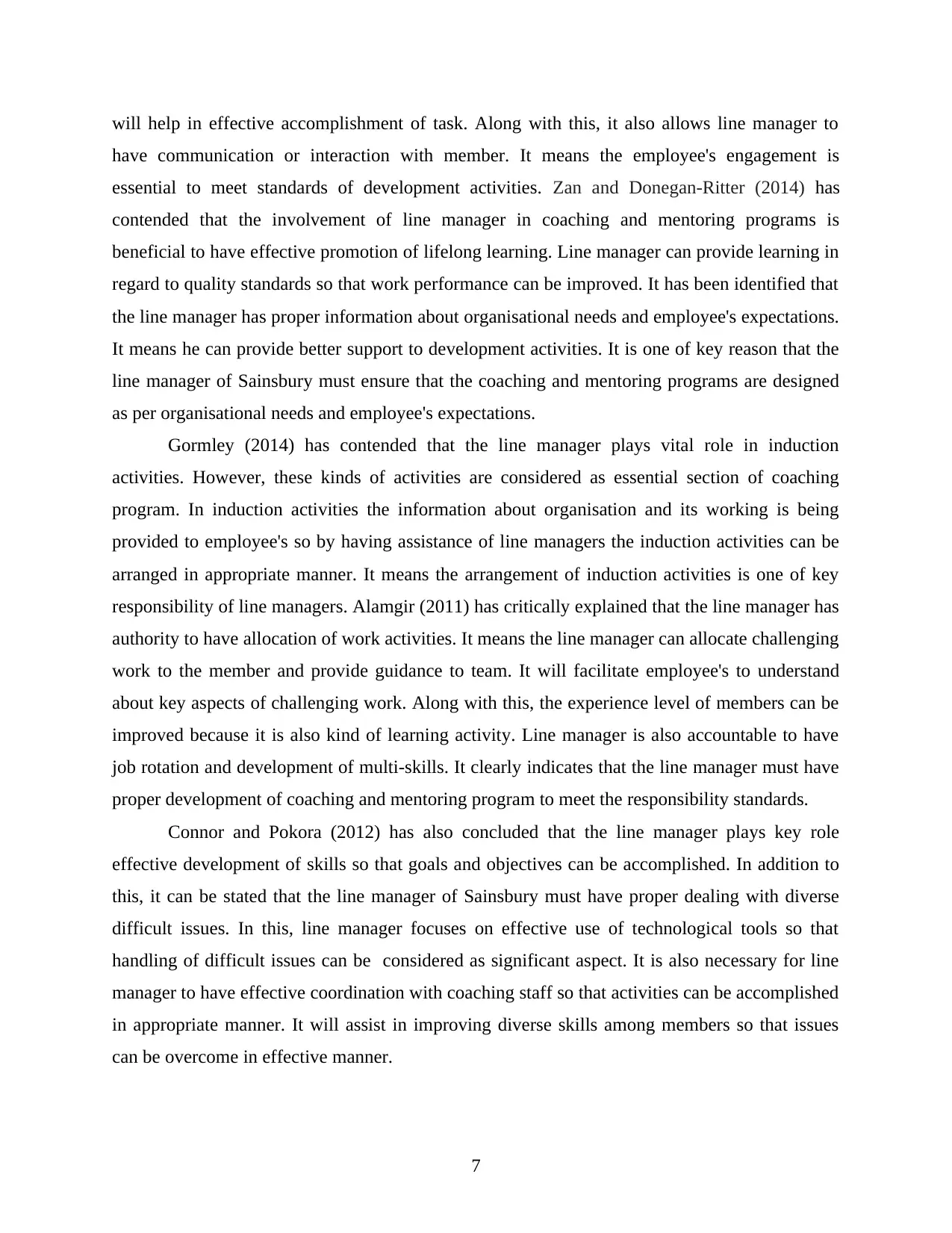
will help in effective accomplishment of task. Along with this, it also allows line manager to
have communication or interaction with member. It means the employee's engagement is
essential to meet standards of development activities. Zan and Donegan-Ritter (2014) has
contended that the involvement of line manager in coaching and mentoring programs is
beneficial to have effective promotion of lifelong learning. Line manager can provide learning in
regard to quality standards so that work performance can be improved. It has been identified that
the line manager has proper information about organisational needs and employee's expectations.
It means he can provide better support to development activities. It is one of key reason that the
line manager of Sainsbury must ensure that the coaching and mentoring programs are designed
as per organisational needs and employee's expectations.
Gormley (2014) has contended that the line manager plays vital role in induction
activities. However, these kinds of activities are considered as essential section of coaching
program. In induction activities the information about organisation and its working is being
provided to employee's so by having assistance of line managers the induction activities can be
arranged in appropriate manner. It means the arrangement of induction activities is one of key
responsibility of line managers. Alamgir (2011) has critically explained that the line manager has
authority to have allocation of work activities. It means the line manager can allocate challenging
work to the member and provide guidance to team. It will facilitate employee's to understand
about key aspects of challenging work. Along with this, the experience level of members can be
improved because it is also kind of learning activity. Line manager is also accountable to have
job rotation and development of multi-skills. It clearly indicates that the line manager must have
proper development of coaching and mentoring program to meet the responsibility standards.
Connor and Pokora (2012) has also concluded that the line manager plays key role
effective development of skills so that goals and objectives can be accomplished. In addition to
this, it can be stated that the line manager of Sainsbury must have proper dealing with diverse
difficult issues. In this, line manager focuses on effective use of technological tools so that
handling of difficult issues can be considered as significant aspect. It is also necessary for line
manager to have effective coordination with coaching staff so that activities can be accomplished
in appropriate manner. It will assist in improving diverse skills among members so that issues
can be overcome in effective manner.
7
have communication or interaction with member. It means the employee's engagement is
essential to meet standards of development activities. Zan and Donegan-Ritter (2014) has
contended that the involvement of line manager in coaching and mentoring programs is
beneficial to have effective promotion of lifelong learning. Line manager can provide learning in
regard to quality standards so that work performance can be improved. It has been identified that
the line manager has proper information about organisational needs and employee's expectations.
It means he can provide better support to development activities. It is one of key reason that the
line manager of Sainsbury must ensure that the coaching and mentoring programs are designed
as per organisational needs and employee's expectations.
Gormley (2014) has contended that the line manager plays vital role in induction
activities. However, these kinds of activities are considered as essential section of coaching
program. In induction activities the information about organisation and its working is being
provided to employee's so by having assistance of line managers the induction activities can be
arranged in appropriate manner. It means the arrangement of induction activities is one of key
responsibility of line managers. Alamgir (2011) has critically explained that the line manager has
authority to have allocation of work activities. It means the line manager can allocate challenging
work to the member and provide guidance to team. It will facilitate employee's to understand
about key aspects of challenging work. Along with this, the experience level of members can be
improved because it is also kind of learning activity. Line manager is also accountable to have
job rotation and development of multi-skills. It clearly indicates that the line manager must have
proper development of coaching and mentoring program to meet the responsibility standards.
Connor and Pokora (2012) has also concluded that the line manager plays key role
effective development of skills so that goals and objectives can be accomplished. In addition to
this, it can be stated that the line manager of Sainsbury must have proper dealing with diverse
difficult issues. In this, line manager focuses on effective use of technological tools so that
handling of difficult issues can be considered as significant aspect. It is also necessary for line
manager to have effective coordination with coaching staff so that activities can be accomplished
in appropriate manner. It will assist in improving diverse skills among members so that issues
can be overcome in effective manner.
7
Paraphrase This Document
Need a fresh take? Get an instant paraphrase of this document with our AI Paraphraser
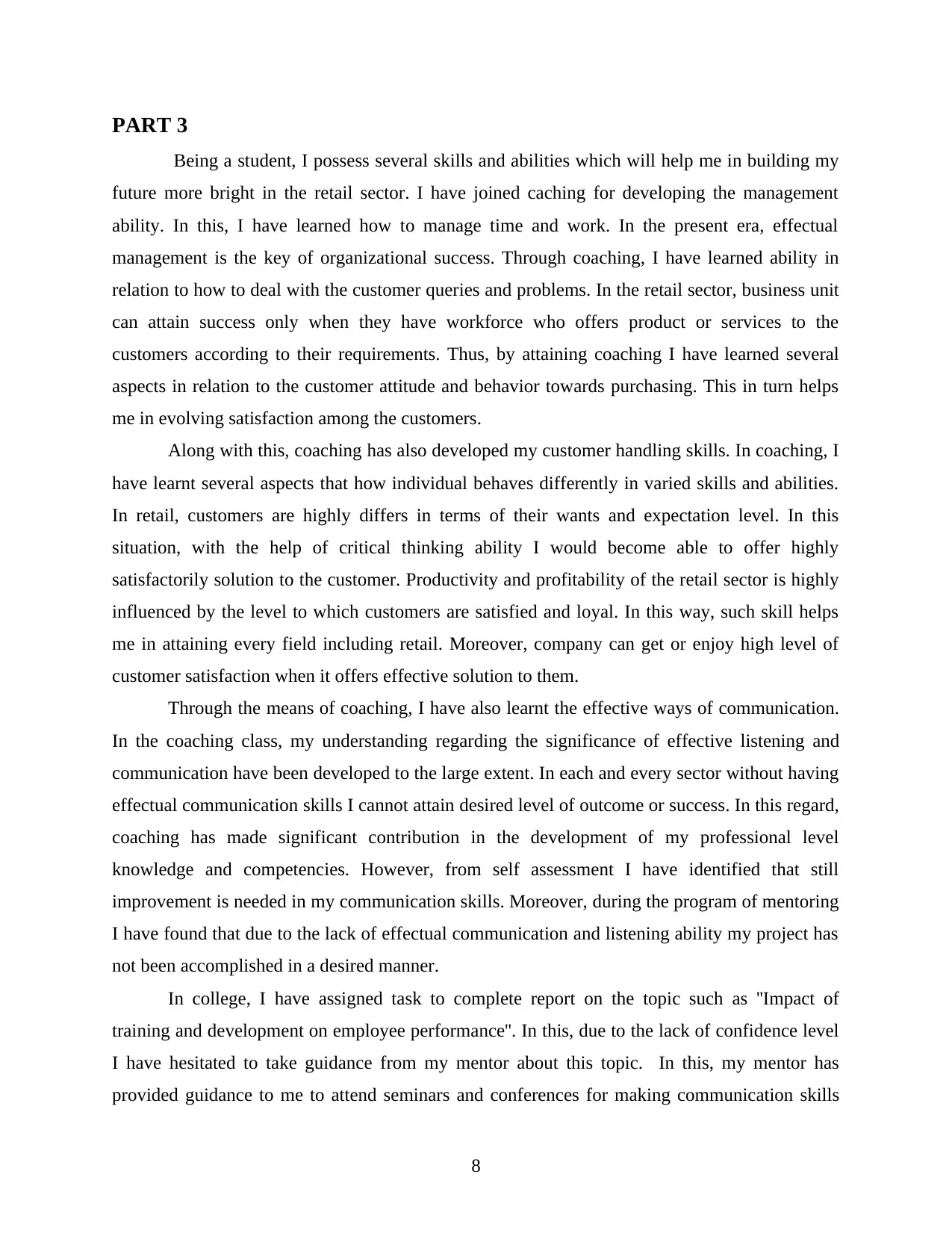
PART 3
Being a student, I possess several skills and abilities which will help me in building my
future more bright in the retail sector. I have joined caching for developing the management
ability. In this, I have learned how to manage time and work. In the present era, effectual
management is the key of organizational success. Through coaching, I have learned ability in
relation to how to deal with the customer queries and problems. In the retail sector, business unit
can attain success only when they have workforce who offers product or services to the
customers according to their requirements. Thus, by attaining coaching I have learned several
aspects in relation to the customer attitude and behavior towards purchasing. This in turn helps
me in evolving satisfaction among the customers.
Along with this, coaching has also developed my customer handling skills. In coaching, I
have learnt several aspects that how individual behaves differently in varied skills and abilities.
In retail, customers are highly differs in terms of their wants and expectation level. In this
situation, with the help of critical thinking ability I would become able to offer highly
satisfactorily solution to the customer. Productivity and profitability of the retail sector is highly
influenced by the level to which customers are satisfied and loyal. In this way, such skill helps
me in attaining every field including retail. Moreover, company can get or enjoy high level of
customer satisfaction when it offers effective solution to them.
Through the means of coaching, I have also learnt the effective ways of communication.
In the coaching class, my understanding regarding the significance of effective listening and
communication have been developed to the large extent. In each and every sector without having
effectual communication skills I cannot attain desired level of outcome or success. In this regard,
coaching has made significant contribution in the development of my professional level
knowledge and competencies. However, from self assessment I have identified that still
improvement is needed in my communication skills. Moreover, during the program of mentoring
I have found that due to the lack of effectual communication and listening ability my project has
not been accomplished in a desired manner.
In college, I have assigned task to complete report on the topic such as ''Impact of
training and development on employee performance''. In this, due to the lack of confidence level
I have hesitated to take guidance from my mentor about this topic. In this, my mentor has
provided guidance to me to attend seminars and conferences for making communication skills
8
Being a student, I possess several skills and abilities which will help me in building my
future more bright in the retail sector. I have joined caching for developing the management
ability. In this, I have learned how to manage time and work. In the present era, effectual
management is the key of organizational success. Through coaching, I have learned ability in
relation to how to deal with the customer queries and problems. In the retail sector, business unit
can attain success only when they have workforce who offers product or services to the
customers according to their requirements. Thus, by attaining coaching I have learned several
aspects in relation to the customer attitude and behavior towards purchasing. This in turn helps
me in evolving satisfaction among the customers.
Along with this, coaching has also developed my customer handling skills. In coaching, I
have learnt several aspects that how individual behaves differently in varied skills and abilities.
In retail, customers are highly differs in terms of their wants and expectation level. In this
situation, with the help of critical thinking ability I would become able to offer highly
satisfactorily solution to the customer. Productivity and profitability of the retail sector is highly
influenced by the level to which customers are satisfied and loyal. In this way, such skill helps
me in attaining every field including retail. Moreover, company can get or enjoy high level of
customer satisfaction when it offers effective solution to them.
Through the means of coaching, I have also learnt the effective ways of communication.
In the coaching class, my understanding regarding the significance of effective listening and
communication have been developed to the large extent. In each and every sector without having
effectual communication skills I cannot attain desired level of outcome or success. In this regard,
coaching has made significant contribution in the development of my professional level
knowledge and competencies. However, from self assessment I have identified that still
improvement is needed in my communication skills. Moreover, during the program of mentoring
I have found that due to the lack of effectual communication and listening ability my project has
not been accomplished in a desired manner.
In college, I have assigned task to complete report on the topic such as ''Impact of
training and development on employee performance''. In this, due to the lack of confidence level
I have hesitated to take guidance from my mentor about this topic. In this, my mentor has
provided guidance to me to attend seminars and conferences for making communication skills
8
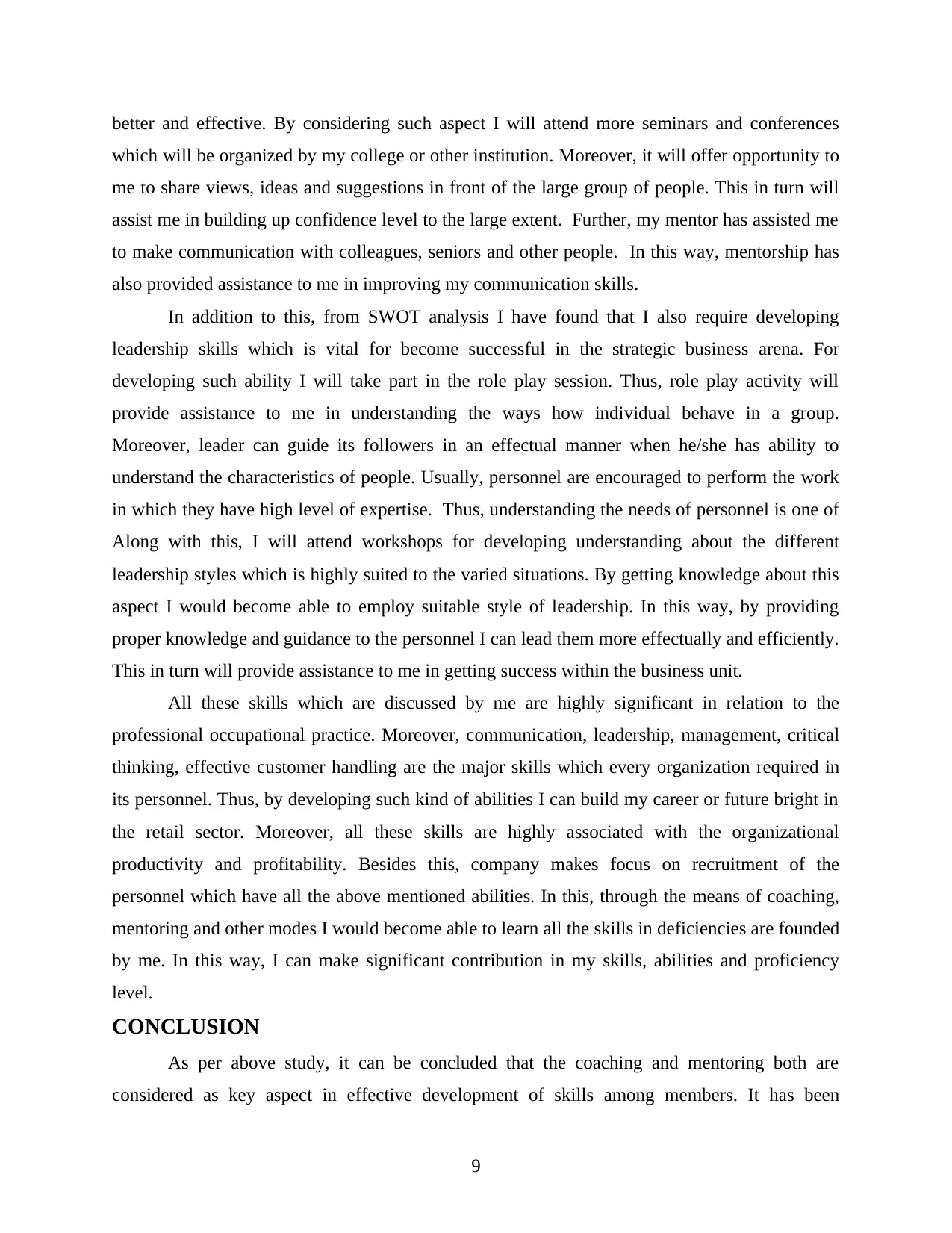
better and effective. By considering such aspect I will attend more seminars and conferences
which will be organized by my college or other institution. Moreover, it will offer opportunity to
me to share views, ideas and suggestions in front of the large group of people. This in turn will
assist me in building up confidence level to the large extent. Further, my mentor has assisted me
to make communication with colleagues, seniors and other people. In this way, mentorship has
also provided assistance to me in improving my communication skills.
In addition to this, from SWOT analysis I have found that I also require developing
leadership skills which is vital for become successful in the strategic business arena. For
developing such ability I will take part in the role play session. Thus, role play activity will
provide assistance to me in understanding the ways how individual behave in a group.
Moreover, leader can guide its followers in an effectual manner when he/she has ability to
understand the characteristics of people. Usually, personnel are encouraged to perform the work
in which they have high level of expertise. Thus, understanding the needs of personnel is one of
Along with this, I will attend workshops for developing understanding about the different
leadership styles which is highly suited to the varied situations. By getting knowledge about this
aspect I would become able to employ suitable style of leadership. In this way, by providing
proper knowledge and guidance to the personnel I can lead them more effectually and efficiently.
This in turn will provide assistance to me in getting success within the business unit.
All these skills which are discussed by me are highly significant in relation to the
professional occupational practice. Moreover, communication, leadership, management, critical
thinking, effective customer handling are the major skills which every organization required in
its personnel. Thus, by developing such kind of abilities I can build my career or future bright in
the retail sector. Moreover, all these skills are highly associated with the organizational
productivity and profitability. Besides this, company makes focus on recruitment of the
personnel which have all the above mentioned abilities. In this, through the means of coaching,
mentoring and other modes I would become able to learn all the skills in deficiencies are founded
by me. In this way, I can make significant contribution in my skills, abilities and proficiency
level.
CONCLUSION
As per above study, it can be concluded that the coaching and mentoring both are
considered as key aspect in effective development of skills among members. It has been
9
which will be organized by my college or other institution. Moreover, it will offer opportunity to
me to share views, ideas and suggestions in front of the large group of people. This in turn will
assist me in building up confidence level to the large extent. Further, my mentor has assisted me
to make communication with colleagues, seniors and other people. In this way, mentorship has
also provided assistance to me in improving my communication skills.
In addition to this, from SWOT analysis I have found that I also require developing
leadership skills which is vital for become successful in the strategic business arena. For
developing such ability I will take part in the role play session. Thus, role play activity will
provide assistance to me in understanding the ways how individual behave in a group.
Moreover, leader can guide its followers in an effectual manner when he/she has ability to
understand the characteristics of people. Usually, personnel are encouraged to perform the work
in which they have high level of expertise. Thus, understanding the needs of personnel is one of
Along with this, I will attend workshops for developing understanding about the different
leadership styles which is highly suited to the varied situations. By getting knowledge about this
aspect I would become able to employ suitable style of leadership. In this way, by providing
proper knowledge and guidance to the personnel I can lead them more effectually and efficiently.
This in turn will provide assistance to me in getting success within the business unit.
All these skills which are discussed by me are highly significant in relation to the
professional occupational practice. Moreover, communication, leadership, management, critical
thinking, effective customer handling are the major skills which every organization required in
its personnel. Thus, by developing such kind of abilities I can build my career or future bright in
the retail sector. Moreover, all these skills are highly associated with the organizational
productivity and profitability. Besides this, company makes focus on recruitment of the
personnel which have all the above mentioned abilities. In this, through the means of coaching,
mentoring and other modes I would become able to learn all the skills in deficiencies are founded
by me. In this way, I can make significant contribution in my skills, abilities and proficiency
level.
CONCLUSION
As per above study, it can be concluded that the coaching and mentoring both are
considered as key aspect in effective development of skills among members. It has been
9
⊘ This is a preview!⊘
Do you want full access?
Subscribe today to unlock all pages.

Trusted by 1+ million students worldwide
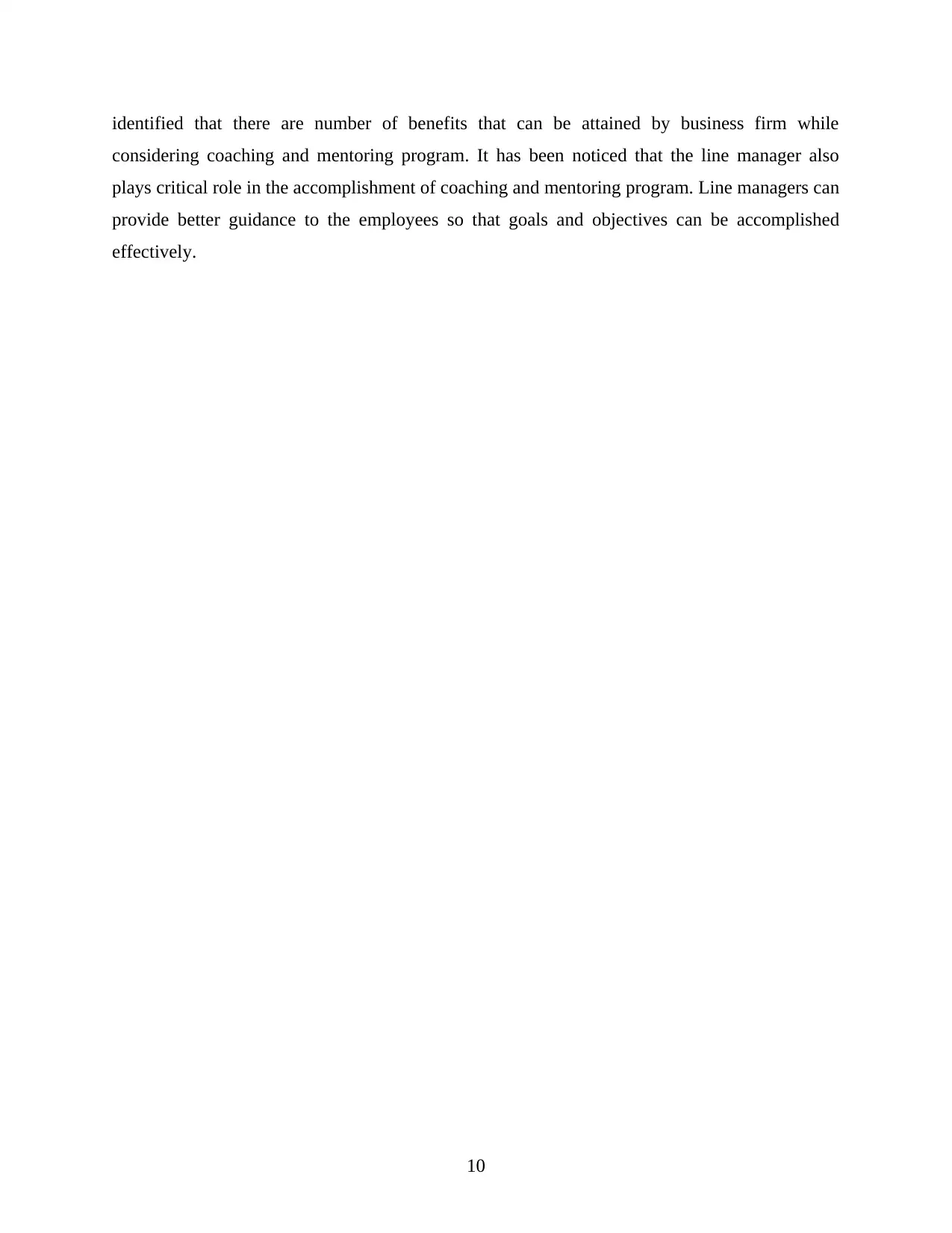
identified that there are number of benefits that can be attained by business firm while
considering coaching and mentoring program. It has been noticed that the line manager also
plays critical role in the accomplishment of coaching and mentoring program. Line managers can
provide better guidance to the employees so that goals and objectives can be accomplished
effectively.
10
considering coaching and mentoring program. It has been noticed that the line manager also
plays critical role in the accomplishment of coaching and mentoring program. Line managers can
provide better guidance to the employees so that goals and objectives can be accomplished
effectively.
10
Paraphrase This Document
Need a fresh take? Get an instant paraphrase of this document with our AI Paraphraser
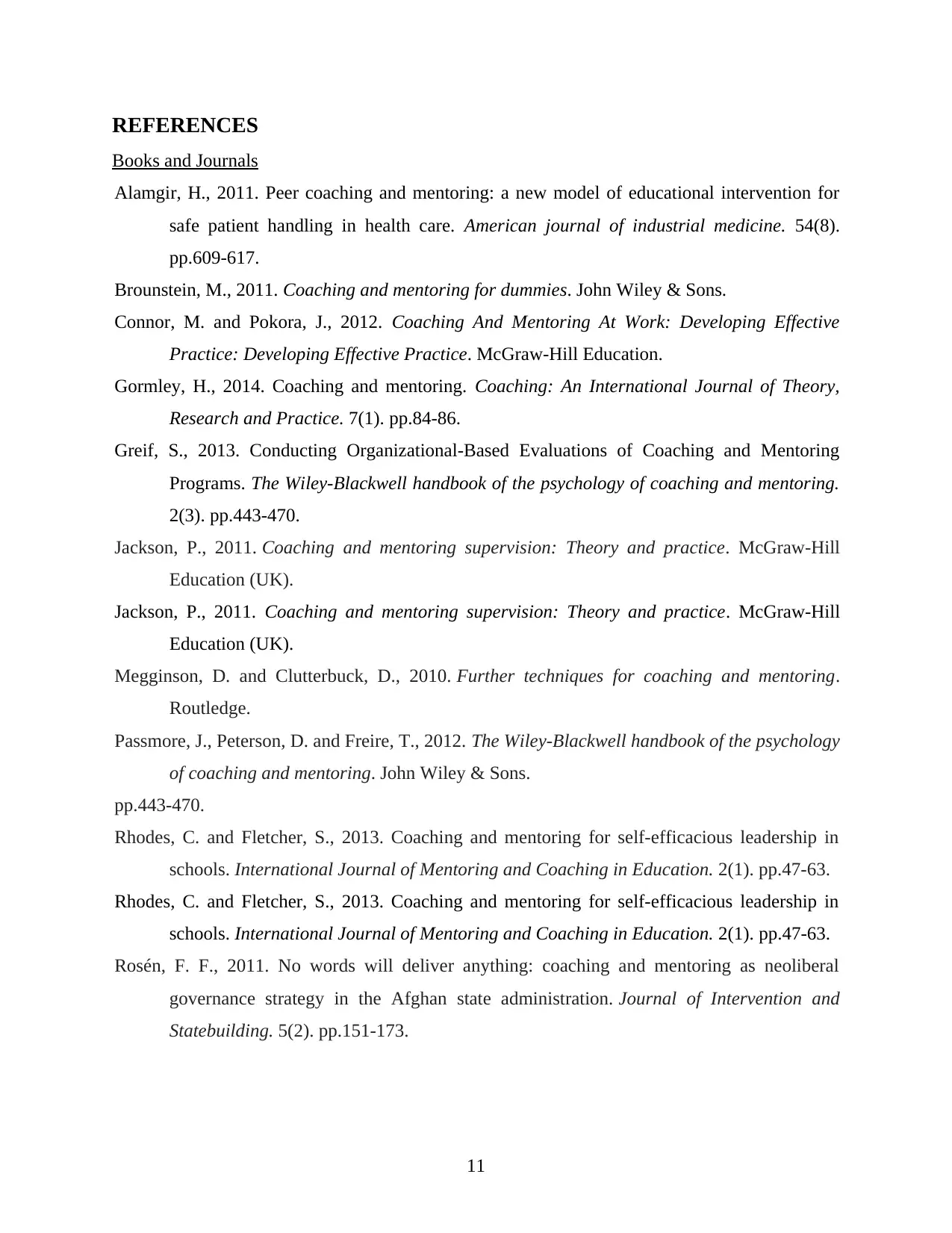
REFERENCES
Books and Journals
Alamgir, H., 2011. Peer coaching and mentoring: a new model of educational intervention for
safe patient handling in health care. American journal of industrial medicine. 54(8).
pp.609-617.
Brounstein, M., 2011. Coaching and mentoring for dummies. John Wiley & Sons.
Connor, M. and Pokora, J., 2012. Coaching And Mentoring At Work: Developing Effective
Practice: Developing Effective Practice. McGraw-Hill Education.
Gormley, H., 2014. Coaching and mentoring. Coaching: An International Journal of Theory,
Research and Practice. 7(1). pp.84-86.
Greif, S., 2013. Conducting Organizational‐Based Evaluations of Coaching and Mentoring
Programs. The Wiley-Blackwell handbook of the psychology of coaching and mentoring.
2(3). pp.443-470.
Jackson, P., 2011. Coaching and mentoring supervision: Theory and practice. McGraw-Hill
Education (UK).
Jackson, P., 2011. Coaching and mentoring supervision: Theory and practice. McGraw-Hill
Education (UK).
Megginson, D. and Clutterbuck, D., 2010. Further techniques for coaching and mentoring.
Routledge.
Passmore, J., Peterson, D. and Freire, T., 2012. The Wiley-Blackwell handbook of the psychology
of coaching and mentoring. John Wiley & Sons.
pp.443-470.
Rhodes, C. and Fletcher, S., 2013. Coaching and mentoring for self-efficacious leadership in
schools. International Journal of Mentoring and Coaching in Education. 2(1). pp.47-63.
Rhodes, C. and Fletcher, S., 2013. Coaching and mentoring for self-efficacious leadership in
schools. International Journal of Mentoring and Coaching in Education. 2(1). pp.47-63.
Rosén, F. F., 2011. No words will deliver anything: coaching and mentoring as neoliberal
governance strategy in the Afghan state administration. Journal of Intervention and
Statebuilding. 5(2). pp.151-173.
11
Books and Journals
Alamgir, H., 2011. Peer coaching and mentoring: a new model of educational intervention for
safe patient handling in health care. American journal of industrial medicine. 54(8).
pp.609-617.
Brounstein, M., 2011. Coaching and mentoring for dummies. John Wiley & Sons.
Connor, M. and Pokora, J., 2012. Coaching And Mentoring At Work: Developing Effective
Practice: Developing Effective Practice. McGraw-Hill Education.
Gormley, H., 2014. Coaching and mentoring. Coaching: An International Journal of Theory,
Research and Practice. 7(1). pp.84-86.
Greif, S., 2013. Conducting Organizational‐Based Evaluations of Coaching and Mentoring
Programs. The Wiley-Blackwell handbook of the psychology of coaching and mentoring.
2(3). pp.443-470.
Jackson, P., 2011. Coaching and mentoring supervision: Theory and practice. McGraw-Hill
Education (UK).
Jackson, P., 2011. Coaching and mentoring supervision: Theory and practice. McGraw-Hill
Education (UK).
Megginson, D. and Clutterbuck, D., 2010. Further techniques for coaching and mentoring.
Routledge.
Passmore, J., Peterson, D. and Freire, T., 2012. The Wiley-Blackwell handbook of the psychology
of coaching and mentoring. John Wiley & Sons.
pp.443-470.
Rhodes, C. and Fletcher, S., 2013. Coaching and mentoring for self-efficacious leadership in
schools. International Journal of Mentoring and Coaching in Education. 2(1). pp.47-63.
Rhodes, C. and Fletcher, S., 2013. Coaching and mentoring for self-efficacious leadership in
schools. International Journal of Mentoring and Coaching in Education. 2(1). pp.47-63.
Rosén, F. F., 2011. No words will deliver anything: coaching and mentoring as neoliberal
governance strategy in the Afghan state administration. Journal of Intervention and
Statebuilding. 5(2). pp.151-173.
11
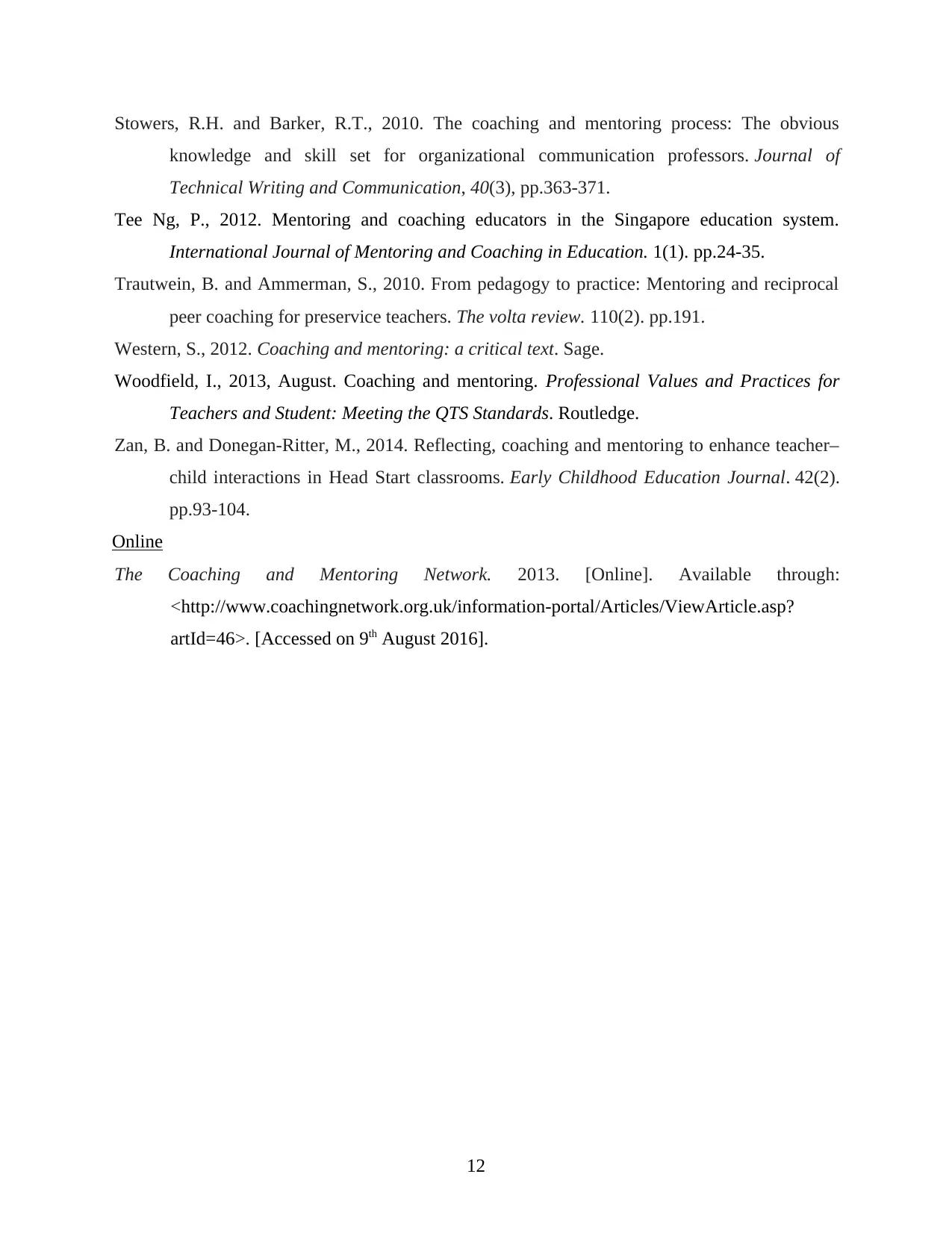
Stowers, R.H. and Barker, R.T., 2010. The coaching and mentoring process: The obvious
knowledge and skill set for organizational communication professors. Journal of
Technical Writing and Communication, 40(3), pp.363-371.
Tee Ng, P., 2012. Mentoring and coaching educators in the Singapore education system.
International Journal of Mentoring and Coaching in Education. 1(1). pp.24-35.
Trautwein, B. and Ammerman, S., 2010. From pedagogy to practice: Mentoring and reciprocal
peer coaching for preservice teachers. The volta review. 110(2). pp.191.
Western, S., 2012. Coaching and mentoring: a critical text. Sage.
Woodfield, I., 2013, August. Coaching and mentoring. Professional Values and Practices for
Teachers and Student: Meeting the QTS Standards. Routledge.
Zan, B. and Donegan-Ritter, M., 2014. Reflecting, coaching and mentoring to enhance teacher–
child interactions in Head Start classrooms. Early Childhood Education Journal. 42(2).
pp.93-104.
Online
The Coaching and Mentoring Network. 2013. [Online]. Available through:
<http://www.coachingnetwork.org.uk/information-portal/Articles/ViewArticle.asp?
artId=46>. [Accessed on 9th August 2016].
12
knowledge and skill set for organizational communication professors. Journal of
Technical Writing and Communication, 40(3), pp.363-371.
Tee Ng, P., 2012. Mentoring and coaching educators in the Singapore education system.
International Journal of Mentoring and Coaching in Education. 1(1). pp.24-35.
Trautwein, B. and Ammerman, S., 2010. From pedagogy to practice: Mentoring and reciprocal
peer coaching for preservice teachers. The volta review. 110(2). pp.191.
Western, S., 2012. Coaching and mentoring: a critical text. Sage.
Woodfield, I., 2013, August. Coaching and mentoring. Professional Values and Practices for
Teachers and Student: Meeting the QTS Standards. Routledge.
Zan, B. and Donegan-Ritter, M., 2014. Reflecting, coaching and mentoring to enhance teacher–
child interactions in Head Start classrooms. Early Childhood Education Journal. 42(2).
pp.93-104.
Online
The Coaching and Mentoring Network. 2013. [Online]. Available through:
<http://www.coachingnetwork.org.uk/information-portal/Articles/ViewArticle.asp?
artId=46>. [Accessed on 9th August 2016].
12
⊘ This is a preview!⊘
Do you want full access?
Subscribe today to unlock all pages.

Trusted by 1+ million students worldwide
1 out of 12
Related Documents
Your All-in-One AI-Powered Toolkit for Academic Success.
+13062052269
info@desklib.com
Available 24*7 on WhatsApp / Email
![[object Object]](/_next/static/media/star-bottom.7253800d.svg)
Unlock your academic potential
Copyright © 2020–2026 A2Z Services. All Rights Reserved. Developed and managed by ZUCOL.





